牛津6AU1-3
牛津小学英语6A教案(全册)
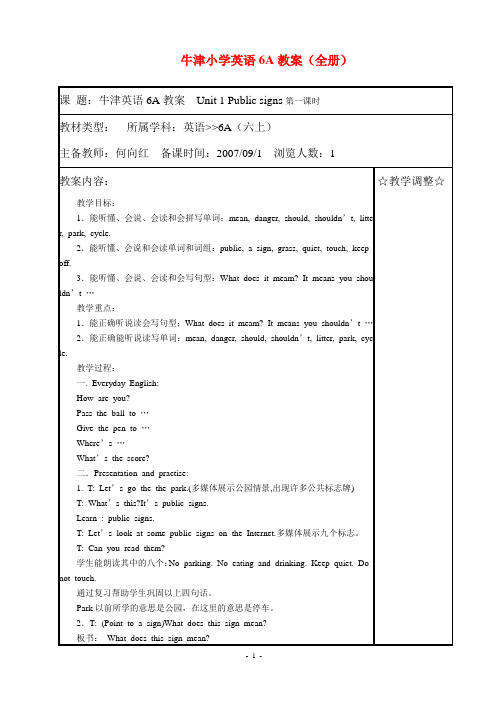
三.Sing a song:
1.学读歌词,注意生词:rubbish, bin.
2.学生听录音学唱。
3.学生齐唱,并请几个学生来表演唱。
四.Draw and guess
1.教师在黑板上画简笔画,让学生猜出公共标志。
7.划出四会单词:danger, mean, must, should, shouldn’t, make.
拼读这些单词。
划出词组:public signs, a lot of questions, different things, on the wall, stay away, walk on the grass, make noise.再次朗读,了解意思。
What is Jack doing now?
What do the signs mean?
What does“Danger”mean?
What does“Keep off the grass”mean?
What does“Keep quiet.”mean?
5.跟录音读对话。
学生分角色朗读。
6.完成课文中的填空题。
二.Presentation and practise:
1. T: Let’s go the the park.(多媒体展示公园情景,出现许多公共标志牌)
T: What’s this?It’s public signs.
Learn : public signs.
T: Let’s look at some public signs on the Internet.多媒体展示九个标志。
2.能听懂、会说和会读单词和词组:public, a sign, grass, quiet, touch, keep off.
牛津小学英语6a

牛津小学英语6A简介《牛津小学英语6A》是一本为6年级学生编写的英语教材。
它是牛津大学出版社出版的,旨在帮助学生提高英语听说读写能力。
课程内容Unit 1: Greetings本单元主要介绍问候语的用法,如Hello、Good morning 等,并通过练习帮助学生掌握这些问候用语。
学生将通过听说练习和角色扮演来增加对这些问候语的熟悉程度。
Unit 2: My School这个单元主要介绍学校生活的相关内容,包括学校设施、校服和课程等。
学生将通过听对话和朗读练习来学习如何用英语描述校园生活。
Unit 3: My Family本单元将帮助学生学习如何用英语描述自己的家人。
学生将通过听故事和填写句子等活动来提高他们的理解和运用能力。
这个单元将帮助学生学习如何用英语谈论自己的爱好。
他们将通过学习一系列的对话和练习来表达他们的兴趣爱好。
Unit 5: Food and Drinks本单元将帮助学生学习食物和饮料方面的词汇。
学生将通过听和说的练习来提高他们的英语表达能力。
Unit 6: Festivals这个单元将向学生介绍一些重要的节日,如圣诞节、感恩节等。
学生将通过阅读和问答来提高他们的阅读和理解能力。
Unit 7: Our World本单元将帮助学生了解地球和环境保护的重要性。
学生将通过观察和讨论来增加他们对环境保护的认识。
Unit 8: Jobs这个单元将介绍一些不同的职业,如教师、医生、警察等。
学生将通过听音频和配对练习来提高他们的词汇记忆和理解能力。
本单元将向学生介绍一些常见的体育运动。
学生将通过观看视频和对话练习来学习如何用英语描述体育运动。
Unit 10: Our Future这个单元将帮助学生思考自己的未来,并学习如何用英语表达自己的目标和梦想。
学生将通过写作和朗读练习来提高他们的表达能力。
学术目标《牛津小学英语6A》旨在帮助学生达到以下学术目标:•提高听力技能:通过听对话、故事和音频来提高学生的听力理解能力。
牛津上海版 6A Module1Unit 3培优试题

Module l Unit 3 综合默写I.单词默写1.度过2.岛屿3.海湾4.龙5.海边、海滨6.好运的、幸运的7.市场8.太空9.博物馆10.活动11.烧烤12.风筝13.沙堡14.搜集15.照片簿、集邮册16.方案17.将要;……好吗18.……点钟19.花费20.旅行II.短语默写1.一张……的地图2.在周末3.离……远4.在沙湾5.在幸运岛6.一张我和我家人的照片7.太空博物馆8.吃午饭/晚饭9.进展一次野餐10.进展一次烧烤11.放风筝12.骑自行车13.堆沙堡14.拾贝壳15.吃冰激凌16.打网球/踢足球/打篮球/打羽毛球17.制作一本相册18.方案做某事19.到达那里20.回来21.乘公交车Ⅲ.句子默写1.你们去过花园城市的哪些地方?2.我和我的妈妈去过月亮城的太空博物馆。
3.一我们要去什么地方?—我们去春天湾的海洋公园吧。
4.要花多少钱?名师点拨1.spend意为“花费〞,既可以表示花钱,又可以表示花时间。
它的固定搭配有:spend (money or time) on sth/spend (money or time) (in) doing sth试比拟spend,pay,cost:这三个词都表示花费金钱。
spend/pay的主语是人.cost的主语是物;spend和pay 的介词搭配不同:pay (money) for sthe.g. I spent 30 yuan on this book. .= I spent 30 yuan (in) buying this book.= I paid 30 yuan for this book.= This book cost me 30 yuan. .2. a photo of my family and me意为“一张我和我妈妈的照片〞。
试比拟a photo of me和a photo of mine:a photo of me强调照片里有“我〞,a photo of mine强调照片是“我〞所拥有的,但照片里不一定有“我〞。
6A牛津译林英语课文

Unit1 The king’s new clothesStory time1.Long long ago,there was a king。
He liked new clothes.One day,two men visited the king.“My king,we can make new clothes for you。
”The king was happy。
2.The two men showed the king his new clothes。
“My king,please try on these magic clothes.Clever people can see them.Foolish people can’t see them。
”3.The king walked through the city in his new clothes.There were a lot of people in the street.They looked at the king and shouted,“What beautiful clothes!”4.A little boy pointed at the king and laughed,“Ha!Ha!The king isn’t wearing any clothes!" Unit2 What a day!Story timeSunday ,20th SeptemberIt was sunny in the morning. Su Hai , Mike ,Liu Tao and I went to the park by bike。
There was a parrot show in the park。
We saw some interesting parrots。
Then,the weather became windy and cloudy。
牛津小学英语6A U1-3知识点
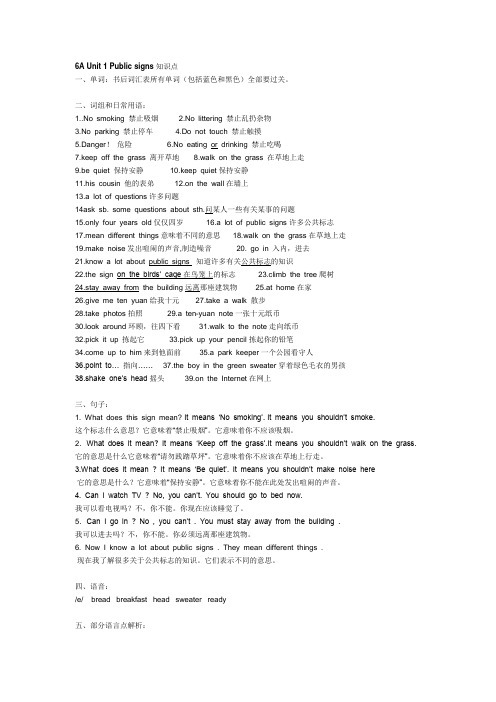
6A Unit 1 Public signs知识点一、单词:书后词汇表所有单词(包括蓝色和黑色)全部要过关。
二、词组和日常用语:1..No smoking 禁止吸烟2.No littering 禁止乱扔杂物3.No parking 禁止停车4.Do not touch 禁止触摸5.Danger!危险6.No eating or drinking 禁止吃喝7.keep off the grass 离开草地8.walk on the grass 在草地上走9.be quiet 保持安静10.keep quiet保持安静11.his cousin 他的表弟12.on the wall在墙上13.a lot of questions许多问题14ask sb. some questions about sth.问某人一些有关某事的问题15.only four years old仅仅四岁 16.a lot of public signs许多公共标志17.mean different things意味着不同的意思18.walk on the grass在草地上走19.make noise发出喧闹的声音,制造噪音20. go in 入内,进去21.know a lot about public signs 知道许多有关公共标志的知识22.the sign on the birds‟ cage在鸟笼上的标志23.climb the tree爬树24.stay away from the building远离那座建筑物25.at home在家26.give me ten yuan给我十元27.take a walk 散步28.take photos拍照29.a ten-yuan note一张十元纸币30.look around环顾,往四下看31.walk to the note走向纸币32.pick it up 拣起它33.pick up your pencil拣起你的铅笔e up to him来到他面前35.a park keeper一个公园看守人36.point to… 指向……37.the boy in the green sweater穿着绿色毛衣的男孩38.shake one‟s head摇头39.on the Internet在网上三、句子:1. What does this sign mean? It means …No smoking‟.It means you shouldn‟t smoke.这个标志什么意思?它意味着“禁止吸烟”。
牛津小学英语6A教案全册

牛津小学英语6A教案全册一、教学内容1. Unit 1 Public signs学习公共场所的标志及其意义。
掌握相关词汇:sign, public, understand, no, smoking, parking, crossing, caution, danger, keep off。
学习一般现在时的用法。
2. Unit 2 National flags认识不同国家的国旗,了解其设计元素和象征意义。
掌握相关词汇:flag, national, country, design, symbol, represent, red, white, blue, star, union jack。
巩固一般现在时的用法。
二、教学目标1. 让学生掌握公共场所标志的英文表达,提高学生的社会常识。
2. 使学生了解各国国旗的特点,拓宽学生的国际视野。
3. 培养学生运用一般现在时描述标志和国旗的能力。
三、教学难点与重点1. 教学难点:公共场所标志的英文表达、国旗设计元素和象征意义的理解。
2. 教学重点:一般现在时的运用,以及相关词汇的掌握。
四、教具与学具准备1. 教具:PPT、公共场所标志卡片、各国国旗图片。
2. 学具:学生用书、练习册、单词卡片。
五、教学过程1. 导入:展示公共场所标志的图片,引导学生用英文表达所见所闻,激发学生兴趣。
2. 新课内容展示:通过PPT展示公共场所标志和各国国旗,引导学生学习相关词汇和一般现在时的用法。
3. 例题讲解:结合教材中的例题,讲解公共场所标志和各国国旗的表达方式,并进行拓展。
4. 随堂练习:学生根据所学内容,完成教材中的练习题,巩固所学知识。
5. 小组讨论:学生分组讨论公共场所标志的作用和各国国旗的特点,提高合作能力。
六、板书设计1. Unit 1 Public signs & Unit 2 National flags2. 主要内容:Unit 1:sign, public, understand, no, smoking, parking, crossing, caution, danger, keep offUnit 2:flag, national, country, design, symbol, represent, red, white, blue, star, union jack3. 重点语法:一般现在时七、作业设计1. 作业题目:(1)根据所学内容,绘制一幅公共场所标志的画,并用英文标注。
上海牛津英语6A M1-U1-P3
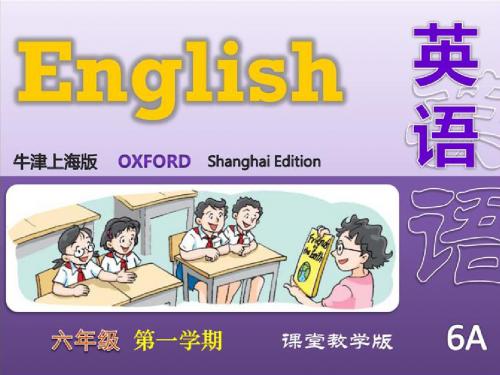
She’s your cousin.
He’s your grandfather.
She’s your granddaughter.
Question number 5: She is my grandfather’s daughter. Her son is your cousin. Who’s she? Question number 6: She’s my aunt’s sister. Her daughter is my sister. Who’s she?
Module 1
Family and friends
Unit 1
Family and relatives
3
2-2 I have two uncles. How many uncles do you h.
only //
I only have one aunt. How many aunts do you have?
She’s your aunt.
She’s your mother.
Question number 7: He is my father’s son. But he’s not my brother. Who’s he?
It’s you.
Look and say
go cycling // play volleyball watch TV watch a film go swimming play football
S1: What else do you do with him? her? them? S2: I sometimes … with him. her. them.
Quiz 1
牛津小学6A unit1-unit3 复习

牛津小学英语6AUnit 11.第一单元出现三个情态动词can(可以,能), should(应该)和must (必须)。
它们的后面都应该用动词原形. 如:It means you should be quiet here. / We must stay away from it.2.mean different things 前面的词一定为复数。
如:The signs mean different things. / They meandifferent things.3.be quiet= keep quiet (保持安静)4.It means 后面如果接标志本身的意思就要用引号引起来如:It means “ No littering”.如果接转述后的意思就不用引号如:It means you shouldn’t litter.5.题目中常常会让学生填 should 或shouldn’t, can 或can’t. 究竟怎样选择肯定或否定呢?要看后面接的这个动作是应该做的还是不应该的,是可以的还是不可以的。
如:The sign on the birds’ cage means we should be quiet .The sign on the birds’ cage means we shouldn’t make noise.6.take a walk 经常有学生会写成 talk a walk 或take a talk ,要注意纠正7. a ten-yuan note一张10元钞票中间有短横而如果就是10块钱 ten yuan 则没有。
8.pick up 把……捡起来当捡起的物品用代词 it/them 代指时,一定要放于中间,如果是具体的名词,中间后面都可以。
如 pick it up 不能写成pick up it , pick the note up 就可以写成 pick up the note.9.这个单元里这样的词组出现了很多词,the sign on the grass, the sign over there, the sign onthe birds’ cage 等,遇到这种类型的词组,我们习惯把地点翻译在前面,如草坪上的标志,在那儿的那个标志,鸟笼子上的标志。
牛津6A配套课件Module 1 Unit 3 WB
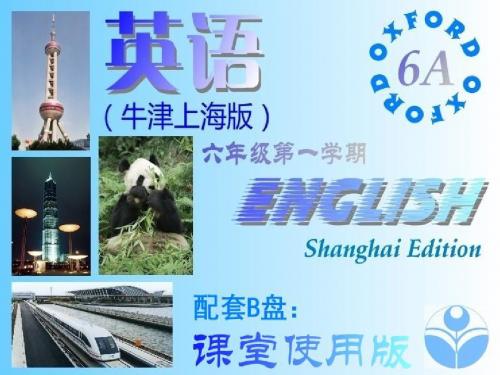
1
2
Let’s visit a place in Garden City. Which place shall we visit?
Car Museum Let’ go to ________________.
Let’ go by ________________. underground
How are we going to get there?
Spaceboy’s friend, John, is going to visit Garden City next Saturday. Spaceboy is writing to John to tell him the visiting plan.
Dear John This is my plan for next Saturday. We are going to visit Garden City Zoo at nine o’clock in the morning. It is near my flat, so we can walk there. It costs ten yuan to visit Garden City Zoo. We are going to spend two hours there and then leave at eleven o’clock. Next, we are going to visit Art Museum. You can see a lot of beautiful paintings there. It is free to go there. It is far away from Garden City Zoo, so we are going to go there by underground. The underground costs four yuan. In the afternoon, we are going to go to Lucky Island by underground. There are some beautiful beaches there. It also costs four yuan for the underground. We are going to come back at five o’clock in the afternoon. The underground back costs five yuan. We will have a wonderful time! Yours
上海牛津6A Module1Unit3
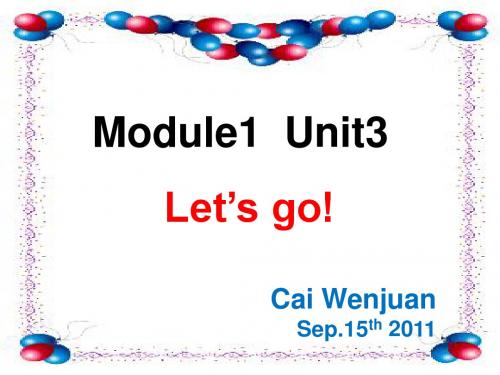
picnic area
(场地,区域)
football pitch
足球场
辨音:
pitch peach ( × )
[I] [i:]
读句子,用你所学的短语或单词 把句子补充完整。
1. I want to swim. I want to swimming pool go to a ______________.
That’s what I want to do.
那就是我想去做的。
That’s what I’m going to do.
那就是我准备去做的。
听音,模仿跟读
小组齐读
Can you make a new poem?
It's Children’s day tomorrow. What do you want to do ? What do you want to do ? I want to __________! That's what I want to do. It's Children’s day tomorrow. What are you going to do ? What are you going to do ? I'm going to ___________! That's what I'm going to do.
Homework
• Oral: Read and recite the new words and text. • Written: A. Copy the new words(6+1). B. Finish the exercise paper.
last year, next Sunday, this evening
牛津小学英语6A各单元 知识梳理
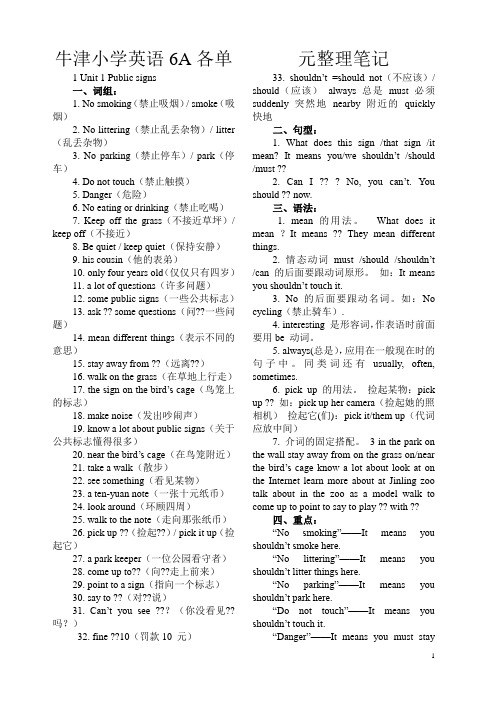
牛津小学英语6A各单元整理笔记1 Unit 1 Public signs一、词组:1. No smoking(禁止吸烟)/ smoke(吸烟)2. No littering(禁止乱丢杂物)/ litter (乱丢杂物)3. No parking(禁止停车)/ park(停车)4. Do not touch(禁止触摸)5. Danger(危险)6. No eating or drinking(禁止吃喝)7. Keep off the grass(不接近草坪)/ keep off(不接近)8. Be quiet / keep quiet(保持安静)9. his cousin(他的表弟)10. only four years old(仅仅只有四岁)11. a lot of questions(许多问题)12. some public signs(一些公共标志)13. ask ?? some questions(问??一些问题)14. mean different things(表示不同的意思)15. stay away from ??(远离??)16. walk on the grass(在草地上行走)17. the sign on the bird’s cage(鸟笼上的标志)18. make noise(发出吵闹声)19. know a lot about public signs(关于公共标志懂得很多)20. near the bird’s cage(在鸟笼附近)21. take a walk(散步)22. see something(看见某物)23. a ten-yuan note(一张十元纸币)24. look around(环顾四周)25. walk to the note(走向那张纸币)26. pick up ??(捡起??)/ pick it up(捡起它)27. a park keeper(一位公园看守者)28. come up to??(向??走上前来)29. point to a sign(指向一个标志)30. say to ??(对??说)31. Can’t you see ???(你没看见??吗?)32. fine ??10(罚款10 元)33. shouldn’t =should not(不应该)/ should(应该)always 总是must 必须suddenly 突然地nearby 附近的quickly 快地二、句型:1. What does this sign /that sign /it mean? It means you/we shouldn’t /should /must ??2. Can I ?? ? No, you can’t. You should ?? now.三、语法:1. mean 的用法。
上海版牛津英语6A单词(有音标)
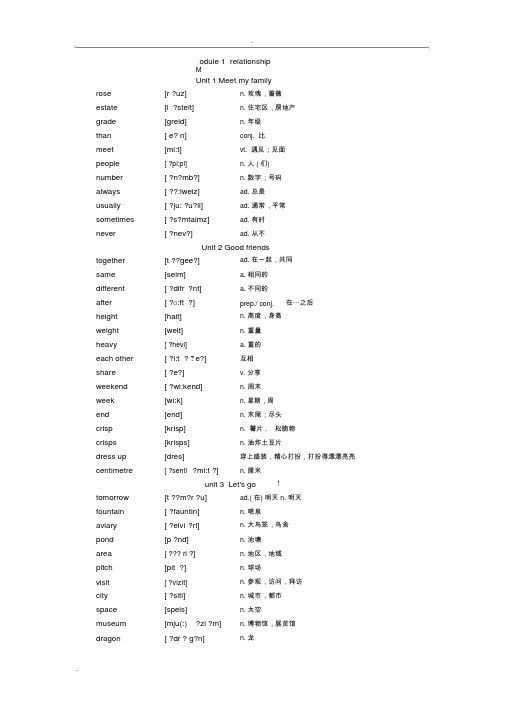
.odule 1relationshipMUnit 1 Meet my familyrose[r ?uz]n. 玫瑰,蔷薇estate[i ?steit]n. 住宅区,房地产grade[greid]n. 年级than[ e? n]conj. 比meet[mi:t]vt. 遇见;见面people[ ?pi:pl]n. 人 ( 们)number[ ?n?mb?]n. 数字;号码always[ ??:lweiz]ad. 总是usually[ ?ju: ?u?li]ad. 通常,平常sometimes[ ?s?mtaimz]ad. 有时never[ ?nev?]ad. 从不Unit 2 Good friendstogether[t ??gee?]ad. 在一起,共同same[seim] a. 相同的different[ ?difr?nt] a. 不同的after[ ?ɑ:ft ?]prep./ conj.在⋯之后height[hait]n. 高度,身高weight[weit]n. 重量heavy[ ?hevi] a. 重的each other[ ?i:t ? ?e?]互相share[ ?e?]v. 分享weekend[ ?wi:kend]n. 周末week[wi:k]n. 星期,周end[end]n. 末尾;尽头crisp[krisp]n. 薯片 ,松脆物crisps[krisps]n. 油炸土豆片dress up[dres]穿上盛装,精心打扮,打扮得漂漂亮亮centimetre[ ?senti?mi:t ?]n. 厘米unit 3Let's go!tomorrow[t ??m?r ?u]ad.( 在) 明天 n. 明天fountain[ ?fauntin]n. 喷泉aviary[ ?eivi?ri]n. 大鸟笼,鸟舍pond[p ?nd]n. 池塘area[ ??? ri?]n. 地区,地域pitch[pit ?]n. 球场visit[ ?vizit]n. 参观,访问,拜访city[ ?siti]n. 城市,都市space[speis]n. 太空museum[mju(:)?zi ?m]n. 博物馆,展览馆dragon[ ?dr ? g?n]n. 龙square[skw ??]ferry[ ?feri]centre[ ?sent ?]west[west]east[i:st]station[ ?stei??n] quickly[ ?kwikli] notice[ ?n?utis] welcome[ ?welk ?m] slowly[ ?sl?uli]nut[n ?t]enough[i ?n?f] shopkeeper[ ???p?ki:p ?] today[t ??dei] yesterday[ ?jest?di] bring[bri?]group[gru:p]Module 2unit 1 neighbourhood[ ?neib ?hud] job[d ??b]engine[ ?end?in]fire-enginespacecraft[ ?speiskr ɑ:ft] farmer[ ?f ɑ:m?]shop[ ??sist?nt] assistantcook[kuk]catch[k ? t ?]safe[seif]teach[ti:t?] dentist[ ?dentist] postman[ ?p?ustm?n] pilot[ ?pail?t] astronaut[ ??str?n?:t] fireman[ ?fai?m?n] waiter[ ?weit?]diver[ ?daiv ?] driver[ ?draiv?] fisherman[ ?fi??m?n].n.正方形;广场n.渡船n.中心n. 西 ( 方,部 )n. 东 ( 方,部 )n.( 车) 站,台,局ad. 快地n.通知vt. / n./ int.欢迎ad. 减速地,缓慢地n.干果,果仁,坚果ad. 足够地,充分地n.( 小店 ) 店主,零售商人n.今天;现今ad. / n.昨天vt. 带来;把⋯引来n.组,群My neighbourhoodPeople' jobsn.四邻,街坊n.工作n.发动机n.消防车n.航天器,宇宙飞船n.农场主,农民n.店员,售货员vt. 烹调,煮,烧n. 厨师vt. 抓住,赶上a.安全的vt. 教,讲授n.牙科医生n.邮递员n.飞行员n.宇航员n.消防队员n.( 男) 侍者, ( 男) 服务员n.潜水员,跳水者n.驾驶员,司机n.渔民,渔夫Unit 2 My home tennis[ ?tenis]n. 网球court[k ?:t]n. 球场kindergarten[ ?kind ??gɑ:tn] address[ ??dres] kitchen[ ?kit ?in] number[ ?n?mb?] cupboard[ ?k?b?d].n.幼儿园n.地址n.厨房n.数字;号码n.食橱,碗橱Unit 3 My streettram[tr? m]n. 有轨电车jam[d ?? m]n. 果酱;拥挤,堵塞traffic jam ['tr? fik交通堵塞d?? m]lot[l ?t]n. 许多,大量a lot of[ ??l ?t ?v]大量的,许多的crowded[ ?kraudid] a. 充 ( 拥) 满了的crowd[kraud]v. 聚集;挤满poem[ ?p?uim]n. 诗litter[ ?lit?]n. 废弃物;杂乱的东西,垃圾pavement[ ?peivm ?nt]n.[ 英] 人行道journey[ ?d??:ni]n. 旅行,行程prince[ ?prins]n. 王子minibus[ ?minib ?s]n. 小型公共汽车Unit 4Ruleszebra[ ?zi:br ?]n. 斑马,斑马线quickly[ ?kwikli]ad. 快地;敏捷地correct[k ??rekt] a. 正确的;合适的belong[bi?l ??]vi. 应归入;适应belong to[bi?l ?? tu]属于,属于⋯一员Module 3 Food and drinksUnit 1 Shopping at the supermarketfridge[frid?]n. 冰箱rice[rais]n. 稻,米,饭cupboard[ ?k?b?d]n. 食橱,碗橱frozen[ ?fr?uzn]adj. 冰冻的,freeze的过去分词freeze[fri:z]v.( 使) 冻结, ( 使) 结冰dairy[ ?de?ri] a. 乳制品的,牛奶的crab[kr? b]n. 蟹steak[steik]n. 牛排,肉排,鱼排lemonade[ ?lem??neid]n. 柠檬水;汽水special[ ?spe??l] a. 特殊的 n. 特价offer[ ??f ?]n. 提供carrot[ ?k? r ?t]n. 胡萝卜onion[ ??nj ?n]n. 洋葱tomato[t ??mɑ:t ?u]n. 西红柿lettuce[ ?letis]n. 莴苣,生菜.cabbage[ ?k? bid ?]n. 卷心菜,洋白菜potato[p ??teit ?u]n. 马铃薯crisp[krisp]n.[ pl.]油炸土豆片snack[sn ? k]n. 快餐,小吃,点心can[k ? n,k ?n]n. 罐 ( 头)list[list]n. 表,目录,名单bottle[ ?b?tl]n. 瓶product[ ?pr ?d?kt]n. 产品carton[ ?kɑ:t ?n]n. 纸板箱,纸板盒Unit 2 Favourite food and drinksbest[best] a. 最好的 ad. 最好,最pancake[ ?p?? ke?k]n. 烙饼 ;薄饼pan[p ? n]n. 平底锅,盘子soya['s?i ?]n.大豆,黄豆soya milk豆浆cereal[ ?si ?ri ?l]n. 加工而成的谷类食物toast[t?ust]n. 烤面包,吐司choose[t?u:z]vt. 选择,挑选sundae[ ?s?nde?]n. 圣代冰激凌Unit 3 Good food,bad foodhealthy[ ?hel θi] unhealthy[ ?n?hel θi] plenty[ ?plenti] yoghurt[ ?j ?g?t]lot[l?t]a lot of[ ??l ?t ?v] squid[skw ?d] cheese[t?i(:)z]pizza[ ?pi:ts?] little[ ?litl]French fries[frent?] bad[b ? d]plate[pleit]slice[slais]ham[h ? m] lettuce[ ?letis] another[ ??n?e?] piece[pi:s]a.健康的;有益健康的a.不健康的n.丰富,充足,大量n.酸奶n.许多,大量大量的,许多的n.鱿鱼n.乳酪,干酪n.意大利馅饼,比萨饼a.小的;短的;不多的炸薯条a.坏的;差的n.盘子n.薄片n.火腿n.莴苣,生菜a. 再一个的 ; 别的n.片,块Unit 4Food from other countries Japan[d ???p? n]n. 日本(国家名称)Canada[ ?k? n?d?]n. 加拿大(国家名称)Australia[ ??streili?]n. 澳洲;澳大利亚Thailand['tail? nd] New Zealand[ ?nju:?zi:l ?nd] USA[ju: es?ei] discuss[dis ?k?s] mixture[ ?mikst ??] minute[ ?minit]dear[di?]cheap[t?i:p]great[greit]menu[ ?menju:].n.泰国n.新西兰n. 美得坚合众国 , 美国vt. 讨论,谈论,论述n.混合;混合物n.分钟a.昂贵的a.廉价的,便宜的a.好极的n.菜单Module 4 Garden City and its neighboursUnit 1 Out and aboutmuseum[mju(:)?zi ?m] end[end]arrive[ ??raiv]north[n ?: θ]south[sau θ]east[i:st]west[west]China[ ?t ?ain ?] compass[ ?k?mp?s] needle[ ?ni:dl]point[p ?int]n.博物馆n.末尾;尽头;终止vi.到达,到来n. 北 ( 方, 部)a. 北方 ( 部 ) 的n.南 ( 方) ,a. 南方 ( 部) 的n. 东 a. 东方 ( 部) 的n. 西 a. 西方 ( 部 ) 的n.中国n.罗盘,罗盘仪n.针,针状物v.指,指明,指出Unit 2 Holidaysbrochure[ ?br ?u??] year[ji?, j?:] trip[trip]stay[stei]plan[pl? n] snowy[ ?sn ?ui] inn[in]relative[ ?rel ?tiv] forecast[ ?f ?:k ɑ:st] wear[we?]hat[h ? t]coat[k ?ut] scarf[sk ɑ:f] shorts[ ??:ts] sandal[ ?s? ndl] clothes[ ?kl?uez] nit 3 Festivals in ChinaUfestival[ ?festiv?l]n.(有插图的)小册子n.年,年份n.旅行,旅游vi.逗留;保持n.计划a.下雪的;多雪的n.小旅馆n. 亲属 ( 戚)n. / vt.预测,预报vt. 穿( 戴 ) 着n.帽子n.上衣,外套n.围巾n.短裤n.凉鞋n.衣服,服装n.节日.thousand[ ?θauz?nd]n. 一千 ( 个)thousands of数千的,无数special[ ?spe??l] a. 特殊的;专门的decoration[ ?dek??rei??n]n. 装饰 ( 品) ;装璜dragon[ ?dr ? g?n]n. 龙mooncake['mu:nkeik]n. 月饼lantern[ ?l ? nt ?n]n. 灯笼,提灯Christmas[ ?krism ?s]n. 圣诞节glue[glu:]n. 胶,胶水Unit 4Sports and activitiessport[sp ?:t]n. 运动activity[ ? k?tiv ?ti]n. 活动,行动entertainment[ ?ent ??teinm ?nt]n. 娱乐sail[seil]vi. 航行 vt. 驾( 船 ) ;航行sewing[ ?s?ui ?]n. 缝纫cinema[ ?sinim ?]n. 电影院collect[k ??lekt]vt. 收集stamp[st ? mp]n. 邮票camp[k ? mp]vi. 野营,设营volleyball[ ?v?lib?:l]n. 排球video[ ?vidi?u]n. 录像 ( 机)model[ ?m?dl]n. 模型;模特儿cinema[ ?sinim ?]n. 电影院decoration[ ?dek??rei??n]n. 装饰 ( 品) ;装璜relative[ ?rel ?tiv]n. 亲属 ( 戚)lantern[ ?l ? nt ?n]n. 灯笼,提灯festival[ ?festiv ?l]n. 节日spend[spend]vt. 用( 钱 ) ;花 ( 时间等 ) packet[ ?p? kit]n. 小包,小盒match[m? t ?]n. 比赛Module 5 ChangeUnit 1 Growing upborn[b ?:n] weight[weit]height[hait]then[ een]than[ e? n, e?n] quite[kwait]quiet[ ?kwai ?t] thumb[ θ?m]pin[ ?pin] sword[s ?:d]a.出生的n.重量n.高,高度,身高ad. 当时;然后conj. 比ad. 相当a.轻声的;安静的n.拇指n.大头针n.剑,刀.feather[ ?fe e?]n. 羽毛hat[h ? t]n. 帽子 ( 通常指有檐的 ) fight against[ ??genst]brave[breiv] a. 勇敢的too[tu:]ad. 也, 还 ; 太, 过于 ; 很, 非常poem[ ?p?uim]n. 诗Unit 2 The weatherweather[ ?wee ?] spring[spri? ] summer[ ?s ? m? ] autumn[ ??:t? m] winter[ ?wint?] plant[plɑ:nt]scarf[skɑ:f]glove[gl? v]boot[bu:t]insect[ ?insekt] dangerous[ ?deind ?? r ? s] typhoon[tai?fu:n] wonderful[ ?w? nd?ful] exciting[ik?saiti? ] frighten[ ?fraitn]sand[s ?nd] barbecue[ ?bɑ:bikju:] interesting[ ?intristi? ] rhyme[raim]turn[t ?:n]begin[bi?gin]win[win]take off n.天气,气象n.春( 天)n.夏天,夏季n.秋,秋季n.冬,冬季n.植物n. 围巾 ( 复数 scarves) n.手套n.靴n.昆虫,虫a.危险的,不安全的n.台风a.极好的;奇妙的a.刺激的,令人兴奋的vt. 使惊恐,吓唬n.沙n.烧烤野餐a.有趣的,引起兴趣的n. 韵,押韵 ( 词)v. 转动 n. 转向;轮流v.开始vi.获胜,赢脱下Unit 3 Changes in Shanghaitown[taun]few[fju:]a fewbuilding[ ?bildi? ] million[ ?milj?n] office[ ??fis]factory[ ?f ? kt ? ri] worker[ ?w? :k ?] builder[ ?bild?] history[ ?hist?ri] museum[mju(:)?zi ?m]n.镇,市镇[ 否] 很少 ( 的), 几乎没有 (的)有些,几个n.建筑物,房屋num.百万,百万个n.办公室n.工厂,制造厂n.工人,劳动者,工作者n.建筑者;创造者n.历史n.博物馆village[ ?vilid? ] boat[b ?ut]other[ ??e ?]noisy[ ?n?izi]next[nekst] change[t ?eind ? ] harbour[ ?hɑ:b ?] airport[ ?e? p?:t]Unit 4 teenager[ ?ti:neid?? ] adult[ ? d? lt] secondary[ ?sek ? nd?ri] primary[ ?praim ? ri] must[m?st].n.村,乡村,村庄n.船,小船a.别的;其余的a.嘈杂的,喧闹的a.紧接在后的;紧邻的v.改变n.海港,港口n.机场,航空港How people changen.(13 ~19 岁的 ) 青少年n.成年人a.第二的;中等的a. 基本的;最初 ( 级) 的aux. v.必须。
牛津英语六年级——6AUnit1(全单元教案及反思)第三课时~.docx

牛津英语六年级——6AUnitl (全单元教案及反思)第三课时〜一教学内容:A 部分Listen, readandsay. 二教学目标:1、能正确理解、掌握A部分会话,并能朗读、初步表演对话。
2、能正确地运用对话中出现的日常交际用语:Therearealotofsignshere・ Theymeandifferentthings・ Keepoffthegrass・ Bequiet・3、熟练掌握四会单词:al ways, aquest ion, ask, mea n,must, shou Id, shouldnr squo; t・4、能听懂、会说和会读单词和词组acousin, apark, public, asign, dan ger, away, gr ass, keepoff , acage, quie t, makenoise ・三教学重点:能正确理解、掌握A部分会话,并能朗读和初步表演对话。
四教学难点:能比较流畅地朗读对话,并能在掌握对话的基础上运用本课所学语言描述公共标志。
五教具准备:三个公共标志牌,录音机。
六教学过程:SteplW arm-up1.G re etings.2.Singtogethe r.用《伦敦桥要倒了》的曲调唱出Whatdo esthissignm ean?(具体见第二课时的Step4)3•检查学生收集的公共标志,并交谈。
比如:A:Whatdoesthi ssignmean?B:Itmeans 1 squo;Noblar ingrsquo:A:CanIblare?B:No, youca nrsquo;t・Yo ushouldnrsq uo;tblareth ecarhorn. Yo ushouldturn offthehorn.Step2Motiva tion.1.Do thecrosswor d: (must, dan ger, litter)2.M akesente nces・e. g・Wemustbequi etinthelibr ory.Wesho uldnrsquo; t littertheru bbish.3.R ep ort汇报预习时总结的词组。
译林牛津英语6A知识点
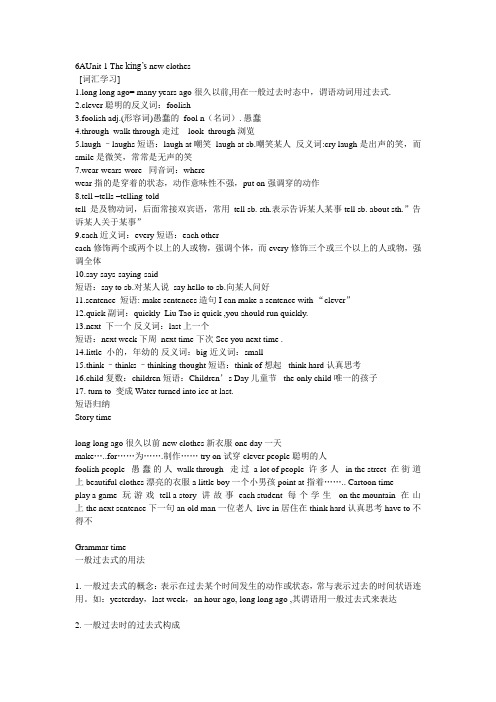
6AUnit 1 The king’s new clothes[词汇学习]1.long long ago= many years ago很久以前,用在一般过去时态中,谓语动词用过去式.2.clever 聪明的反义词:foolish3.foolish adj.(形容词)愚蠢的 fool n(名词). 愚蠢4.through walk through走过 look through浏览ugh –laughs 短语:laugh at 嘲笑 laugh at sb.嘲笑某人反义词:cry laugh 是出声的笑,而smile 是微笑,常常是无声的笑7.wear-wears-wore 同音词:wherewear指的是穿着的状态,动作意味性不强,put on 强调穿的动作8.tell –tells –telling-toldtell是及物动词,后面常接双宾语,常用tell sb. sth.表示告诉某人某事 tell sb. about sth.”告诉某人关于某事”9.each 近义词:every 短语:each othereach修饰两个或两个以上的人或物,强调个体,而every修饰三个或三个以上的人或物,强调全体10.say-says-saying-said短语:say to sb.对某人说 say hello to sb.向某人问好11.sentence 短语: make sentences 造句I can make a sentence with “clever”12.quick 副词:quickly Liu Tao is quick ,you should run quickly.13.next 下一个反义词:last 上一个短语:next week下周 next time 下次 See you next time .14.little 小的,年幼的反义词:big 近义词:small15.think –thinks –thinking-thought 短语:think of想起 think hard 认真思考16.child复数:children 短语:Children’s Day儿童节 the only child 唯一的孩子17. turn to 变成 Water turned into ice at last.短语归纳Story timelong long ago 很久以前 new clothes 新衣服 one day 一天make…..for……为…….制作…… try on试穿 clever people聪明的人foolish people愚蠢的人 walk through走过 a lot of people 许多人in the street 在街道上 beautiful clothes漂亮的衣服 a little boy 一个小男孩 point at指着…….. Cartoon timeplay a game 玩游戏 tell a story 讲故事 each student 每个学生on the mountain 在山上 the next sentence 下一句 an old man 一位老人live in 居住在 think hard 认真思考 have to 不得不Grammar time一般过去式的用法1. 一般过去式的概念:表示在过去某个时间发生的动作或状态,常与表示过去的时间状语连用。
牛津6AM1U3(ppt文档)
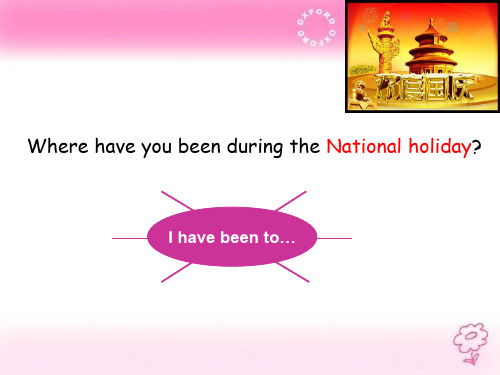
I have been to…
U3 Spending a day out together
Read P17 silently, underline the answer Where have they been in Garden City?
Gulliver has been to four places.
He has been to a strange island called Lilliput. And the people there are only six inches tall! So they made a special house for Gulliver.
Peter has been to Museum in Moon Town. They are buying tickets together.
Jill has been to Ocean Park in Spring Bay. They are eating ice-cream together.
During the National Day, I have been to my hometown. Look! This is a photo of my son and me. We are climbing mountains and visiting the Ruins of the Great Wall.
market //
I’ve been to Green Market in Sunny Town. This is a photo of my mother and me. We’re shopping together.
上海牛津版6AUnit1-Unit3期中复习讲义设计
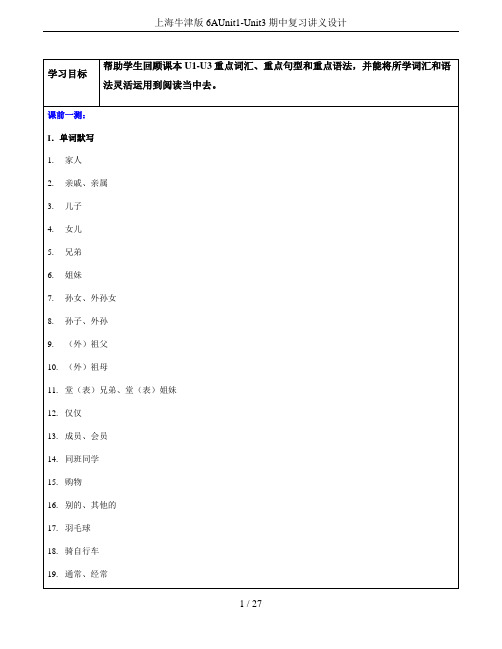
set
安排,安置
spread
spread
spread
展开,传播,涂
shut
shut
shut
关上.停止营业
2.AAB
动词原形
过去式
过去分词
词义
beat
beat
beaten
打败
3.ABA
动词原形
过去式
过去分词
become
became
become
come
came
come
run
ran
run
overcome
carry out one’s promise履行承诺
promise to do sth.承诺做某事promise not to do sth.承诺不做某事。
7.look after=take care of=care for照顾
pollutethe environment污染环境
8.put rubbish into rubbish bin把垃圾扔进垃圾箱里
9.tell sbto do sth.告诉某人做某事。tell sbnot to do sth.告诉某人不要做某事。
例如:tell peoplenot to leave rubbish.告诉某人不要乱丢垃圾
10.be late for ……迟到
11.be kind to…..对……友好
12.get angry生气
过去分词
词义
broadcast
broadcast
broadcast
广播.播放.播送
burst
burst
burst
爆炸.突然发作
cost
cost
上海牛津英语6AU1-U10_重要词组(默写版)
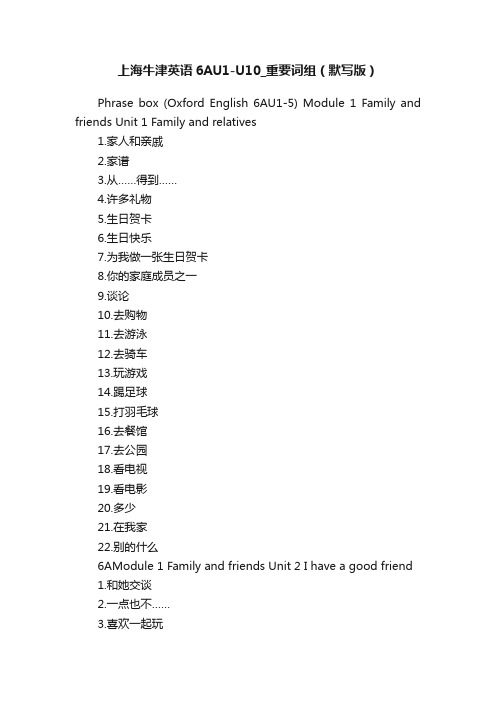
上海牛津英语6AU1-U10_重要词组(默写版)Phrase box (Oxford English 6AU1-5) Module 1 Family and friends Unit 1 Family and relatives1.家人和亲戚2.家谱3.从……得到……4.许多礼物5.生日贺卡6.生日快乐7.为我做一张生日贺卡8.你的家庭成员之一9.谈论10.去购物11.去游泳12.去骑车13.玩游戏14.踢足球15.打羽毛球16.去餐馆17.去公园18.看电视19.看电影20.多少21.在我家22.别的什么6AModule 1 Family and friends Unit 2 I have a good friend1.和她交谈2.一点也不……3.喜欢一起玩4.几乎每一天5.不能读和写6.在晚上出去7.一条小狗8.喜欢在一起9.步行去学校10.吃午饭11.分享食品12.互相帮助13.帮助他人14.友善待人,助人为乐15.勤奋学习16.上学(从不)迟到17.(从不)生气18.对别人友好19.(从不)淘气20.(从不)说谎21.参观花园城市22.第一次23.询问某人关于某事24.海洋公园25.北部城市公园26.水世界27.花园城市动物园28.. …怎么样29.在周六30.去过…31.已经去过…32.刚刚去过…33.还没有去过…34.去过那里35.地球的朋友36.保护环境37.我们周围所有的东西38.破坏环境39.空气污染40.水污染41.土地污染42.帮助保持环境干净43.保持…44.捡起垃圾45.把垃圾扔进垃圾箱46.告诉人们不要乱扔垃圾47.告诉某人不要做某事48.想要做某事49.承诺做某事50.承诺不做某事51.承诺保持学校干净52.承诺再利用购物袋53.承诺不乱扔垃圾6AModule 1 Family and friends Unit 3 Spending a day out together1.绿岛的地图2.在周末3.在龙湾4.离…...远5.在幸运岛6.一张我家人和我的照片7.太空博物馆8.吃冰淇淋10.谈论11.打网球12.打篮球13.野餐14.烧烤15.吃饭16.放风筝17.骑自行车18.堆沙堡19.拾贝壳20.制作相册21.带一些照片到班上22.计划一次参观23.plan 计划参观一个地方24.哪个地方25.到达那里26.go there by bus.= 一起乘车去那里27.回来28.how about= +doing sth.29.why not + do sth. 做……怎么样为什么不做……6AModule 2 Places and activities Unit 4 What would you like to be?1.教我们英语2.使病人康复3.开车4.灭火5.为人们烧食物6.想要成为/做……7.保障我们城市的安全9.查明;弄清(情况)10.开始工作11.结束工作12.帮助某人做某事不同的工作。
- 1、下载文档前请自行甄别文档内容的完整性,平台不提供额外的编辑、内容补充、找答案等附加服务。
- 2、"仅部分预览"的文档,不可在线预览部分如存在完整性等问题,可反馈申请退款(可完整预览的文档不适用该条件!)。
- 3、如文档侵犯您的权益,请联系客服反馈,我们会尽快为您处理(人工客服工作时间:9:00-18:30)。
He is asking Ben some questions about them.
There are a lot of signs here.
They mean different things.
3.学会和他人谈论所见到的公共标志。
教学步骤:
Step 1 : Review the sentences below:
What does this / that / sign it mean ?
It means “____________”.
It means you should ( not ) ….
How old is Jack’s cousin ?
Does he always have a lot of questions ?
What does he find in the park ?
How many signs do they talk about ?
Does Jack know the meanings of the signs ?
His cousin , four years old , a lot of questions , some public signs , ask Ben some question about the signs , mean different things, stay away from the building, walk on the grass , on the bird’s cage , make noise
Step 2: Educe the new lesson and learn the new words and sentences.
T:( Take out the pictures of Part A.) It is Saturday . Ben and his cousin are in the park.
学习新单词和词组
all day---way
↖↙
always
stay away from
keep off
make noise
(在学习单词和句子的过程中,让学生根据实际情况,用所学的新单词来组词,根据所学新句型的模式,替换单词灵活练习句子。如:学习cousin这个词时,可以说:my cousin , your cousin , How many cousins do you have ?等等。学习这个句子时:He is asking Ben some questions about them.可以进行替换练习。
They are talking about the signs in the park. . What are they saying ? We will learn their conversation. First let’s learn the new words and sentences.
六年级英语学科教案
Unit1 Public signs
第三教时
教学目标:
1.掌握下列单词、词组: must(必须,应当), should(应该,应当), shouldn’t = should not(不应该), cousin(堂/表兄弟姐妹), always(总是), question(问题), make(制造), make noise [发出(喧闹)声音] away(离)开
You must stay away from the building.
Step 3 : Learn the conversation.
a.Close your books , listen to the tape ( twice ).
b.Then try to answer my questions.
What does the each sign mean ?
c.Open your books , then read the conversation after the tape .
d.Then read it with your partners.
e.Then try to act it.
f.Underline the phrases of Part A.
2.掌握句子:
Jack is only four years old but he always has a lot of questions.
He is asking Ben some questions about them.。There are a lot of signs here.
They mean different things. You must stay away from the building.
Step 4: Homework:
1.Copy the new words and the phrases , then put them into Chinese .
2.Try to recite the conversation and act it after class.
教学重点和难点:
1、在理解的基础通读A部分对话。
Then learn the words and sentences:
must(必须,应当), should(应该,应当), shouldn’t = should not(不应该), cousin(堂/表兄弟姐妹), always(总是), question(问题), make(制造), make noise [发出(喧闹)声音] only(只,仅仅)away(离)开, stay away from (远离。。。) cage (笼子)
2、学会和他人谈论所见到的公共标志。
用所学标志性英语用语复习本课句型。
首先听录音,了解对话背景。回答问题
What day is it today?
Who areBiblioteka in the park?What are they doing?
学生回答完后,要求学生自读背景,学习新单词cousin.
读背景。
看课文,听课文录音。
